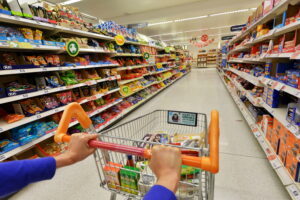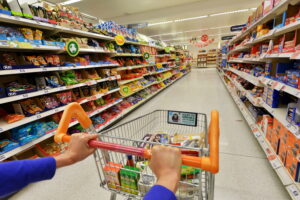
Sainbury’s has raised its forecast for full-year profits after bumper food and drink sales over Christmas and a record new year performance.
Britain’s second biggest supermarket chain cashed in as spending in restaurants fell by more than 14 per cent in December compared with the same month in 2019, according to data from Barclaycard, with office Christmas parties and meetings with friends cancelled because of the Omicron variant of the coronavirus.
Food sales at Sainbury’s between the end of November and January 8 were up by 0.1 per cent on the same period of 2020, despite last year benefiting from the stay-at-home order issued to many areas in the run-up to Christmas.
Simon Roberts, the grocer’s chief executive, said that more people had eaten at home and had “treated” themselves, helping the supermarket chain to increase its market share. He added that Sainsbury’s had enjoyed its “biggest ever new year”.
However, total sales over that six-week period, excluding fuel, were down 2.9 per cent year-on-year, reflecting a fall in demand for new and a weaker performance at the group’s Argos subsidiary after an “exceptional” showing during Christmas 2020.
In the 16 weeks to January 8, Sainsbury’s third quarter, sales fell by 5.3 per cent. The City had expected that sales would struggle to match last year’s performance, but analysts had pencilled in a decline of only about 3 per cent.
Despite the sales miss, Sainsbury’s gave the market the profit upgrade that it had been wanting. Strong grocery sales, coupled with cost savings and fewer bad debts in its bank division, meant that profits for its present financial year, which runs until the end of March, would be at least £720 million, it said, about £60 million more than previous guidance.
Sainsbury’s has just over 15 per cent of the UK grocery market. It employs 180,000 people and has 1,411 stores. As well as the supermarkets, Sainsbury’s owns Argos, which it bought for £1.2 billion in 2016. It has closed high street Argos stores and incorporated the business into its supermarkets. The City expects full-year sales of food, clothes and other goods of about £29 billion.
Shares in Sainsbury’s rose by 8¾p, or 3.1 per cent, to 288p, valuing the business at nearly £7 billion.
Christmas shoppers tend to buy more expensive foods over the festive season and Sainsbury’s Taste the Difference line, including new additions such as Bucks Fizz, smoked salmon and its Belgian chocolate and salted caramel star, was its fastest-growing product tier.
The launch of its Aldi price match campaign, which included its “lowest ever priced Christmas dinner”, helped it to increase market share and its price cuts mean that Sainsbury’s offer is now said to be “more competitive than ever”.
General merchandise sales, which include Argos’s contribution, were down 16 per cent in the third quarter, which James Grzinic, a retail analyst at Jefferies, described as “very weak”.
That was partly to do with strong comparatives from the previous year, but Sainsbury’s also noted that there had been “limited availability in key product areas” as the supply chain troubles that most businesses have been suffering persists. Bosses also brought in fewer promotions and markdowns in order to “focus on profitable sales”.
Profits at Sainsbury’s Bank are “running ahead of consensus”, the company said. Fewer people defaulting on loans means that bad debts were “lower than expected”, while lending volumes were “starting to recover”.
Read more:
Sainsbury’s can taste the difference with bumper Christmas food sales
